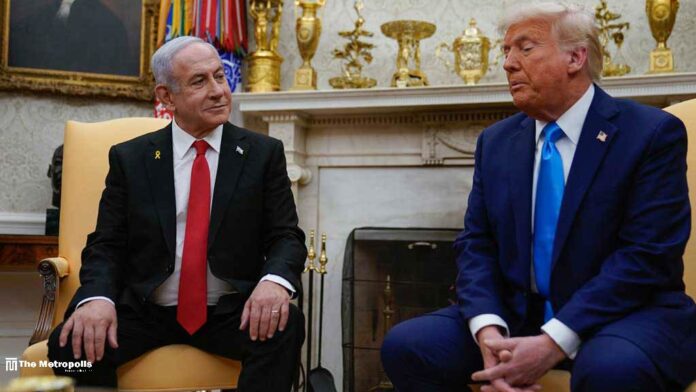President Donald Trump announced that the United States would assume control of the war-torn Gaza Strip, rebuild it economically, and relocate its Palestinian population elsewhere. His remarks, which mark a dramatic shift from longstanding U.S. policy on the Israeli-Palestinian conflict, were made during a joint press conference on Tuesday with Israeli Prime Minister Benjamin Netanyahu.
Earlier the same day, Trump had suggested permanently resettling Gaza’s more than two million residents in neighboring countries. Calling the enclave a “demolition site,” he argued that a U.S.-led redevelopment effort could transform it into “The Riviera of the Middle East.”
Trump’s proposal is expected to face strong opposition from both allies and adversaries. It also raises questions about Saudi Arabia’s willingness to engage in renewed U.S.-led negotiations for normalizing ties with Israel. A direct U.S. role in Gaza would contradict Washington’s long-standing stance—alongside much of the international community—that Gaza should be part of a future Palestinian state alongside the West Bank.
Trump’s Vision for Gaza
“The U.S. will take over the Gaza Strip, and we will do a job with it too,” Trump declared. “We’ll own it and be responsible for dismantling all of the dangerous unexploded bombs and other weapons on the site.”
He described plans for a large-scale economic revitalization, claiming, “We’re going to develop it, create thousands and thousands of jobs, and it’ll be something that the entire Middle East can be very proud of.” Asked who would live there, Trump responded that Gaza could become a home for “the world’s people.”
Despite the bold claims, Trump did not address how the U.S. would legally assume control of Gaza, a densely populated coastal strip with a history of violent conflict. Previous U.S. administrations, including his own, have avoided direct military engagement in the territory.
Reactions and Implications
Trump’s proposal immediately drew condemnation from several Democratic lawmakers. Netanyahu, whom Trump repeatedly referred to as “Bibi,” avoided commenting in detail but praised Trump for offering “fresh ideas” and “thinking outside the box.”
Some analysts suggest that Trump’s extreme policy positions may be strategic, aimed at setting the stage for negotiations. In his first term, he frequently made dramatic foreign policy declarations that were never implemented.
Experts warn that a U.S. takeover of Gaza would likely require a prolonged military presence and could be perceived in the Arab world as another failed U.S. attempt at nation-building akin to Iraq and Afghanistan.
Permanent Resettlement of Gazans?
Trump also doubled down on his earlier call for Jordan, Egypt, and other Arab states to accept Gazans, this time insisting that Palestinians should be permanently resettled elsewhere. This stance aligns with views held by Israel’s far-right but contradicts President Joe Biden’s position against mass displacement.
The forced removal of Gaza’s population would likely be considered a violation of international law and strongly opposed by Washington’s allies. Senior Hamas official Sami Abu Zuhri condemned Trump’s comments, calling them a plan for expulsion that Gaza’s people would never accept.
International Concerns and Geopolitical Impact
The Saudi government swiftly rejected any attempt to displace Palestinians and reiterated that normalization with Israel depends on establishing a Palestinian state.
Trump’s remarks came just two weeks into his second term and followed a series of controversial foreign policy statements. He has recently suggested the U.S. should acquire Greenland, take control of the Panama Canal, and make Canada the 51st state—comments that critics argue echo old-style imperialism.
Describing Gaza as a long-standing “symbol of death and destruction,” Trump proposed that the site be “leveled” and rebuilt under U.S. leadership. However, he provided no details on how the U.S. would take possession of the enclave or secure it.
His comments also raise uncertainty about ongoing ceasefire negotiations in Gaza, as Hamas insists on remaining in the territory while Netanyahu has vowed to destroy the group.
Trump’s Middle East envoy, Steve Witkoff, who played a role in securing the initial ceasefire deal before Trump’s inauguration, confirmed discussions with Netanyahu on Monday and plans to meet Qatar’s prime minister—another key mediator—later in the week.
As the international community reacts to Trump’s sweeping proposals, the feasibility of a U.S. takeover of Gaza remains deeply uncertain.



